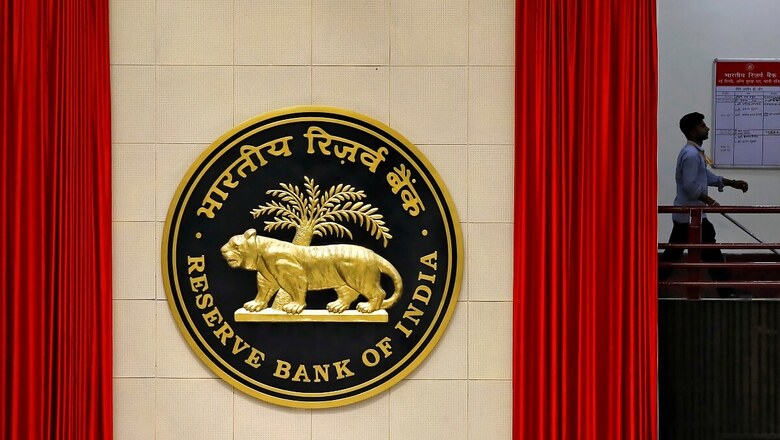RBI May Well Be Cautious With its Renewed Corporate Push to Banking Sector as Experts Raise Concerns

views
About six years ago, when the Reserve Bank of India (RBI) allowed IDFC and Bandhan Financial Services to set up private banks, the entire process took nearly four years from the first announcement and then, only these two applicants out of 25 were given the go-ahead.
The central bank had initially proposed that large corporate houses be allowed to promote banks but seemed to backtrack later. Now, as it has once again invited public comments for easing regulations for private banks, including allowing corporate houses to own banks, it is possible that the process this time too would not be swift and the RBI could well backtrack once again.
For one, allowing large corporates/industrial houses into private banks would require an amendment to the Banking Regulation Act of 1949, a time-consuming process. Second, the recent scares in India’s banking system would likely act as huge deterrents. Last, but not the least, a number of warnings have already been issued by experts, including a former RBI governor, against allowing corporate houses more banking play.
This push for getting large corporates/industrial houses into private banks comes just after recent instances of banks floundering. First, it was the country’s biggest cooperative bank, PMC Bank, then YES Bank and now, Lakshmi Vilas Bank. In all these instances, the RBI had to supersede the banks’ boards and lead the rescue operation, placing depositors under a moratorium for different periods. As for other instances of private lenders floundering, who can forget the IL&FS fiasco and its continuing contagion?
An Internal Working Group (IWG) of the RBI has proposed sweeping changes. Some of its proposal are:
1) Cap on promoters’ stake in the long run (15 years) may be raised from 15% to 26% of the paid-up voting equity share capital of the bank. Non-promoter shareholding should be capped at 15%.
2) Large corporate/industrial houses may be allowed as promoters of banks after necessary amendments to the Banking Regulation Act, 1949. This would prevent connected lending and exposure between the banks and other financial and non-financial group entities. Also, only after strengthening of the supervisory mechanism for large conglomerates, including consolidated supervision.
3) Well run large Non-banking Finance Companies (NBFCs), with an asset size of ₹50,000 crore and above, including those which are owned by a corporate house, may be considered for conversion into banks subject to conditions.
4) The minimum initial capital requirement for licensing new banks should be enhanced from ₹500 crore to ₹1000 crore for universal banks, and from ₹200 crore to ₹300 crore for small finance banks.
While all of these proposals seek to strengthen the grip of private entities on India’s banking and financial sector, it is the proposal about corporate houses entering banking which has raised the hackles of experts.
Analysts at a prominent brokerage have pointed out that the RBI backtracked on this provision last time, claiming concerns around governance and pointed out that the experience of allowing corporates to get a bank license in other countries has “not been good”.
They advised careful perusal of the ‘pros and cons’ of such a move and putting in place adequate regulatory structures before large corporate entities are allowed in.
Former RBI governor Raghuram Rajan and former deputy governor Viral Acharya have together warned against allowing large corporate houses to own banks. The duo has questioned the timing of this move, saying “have we learnt something that allows us to override all prior cautions on allowing industrial houses into banking? We would argue no. Indeed, to the contrary, it is even more important today to stick to the tried and tested limits on corporate involvement in banking”.
And sensing an opportunity to revisit his ‘suit boot ki sarkar’ jibe, Congress leader Rahul Gandhi has also lampooned the RBI proposal on allowing corporate houses to own banks. Gandhi wrote on Twitter, “Chronology samajhiye: First, karz maafi for few big companies. Next, huge tax cuts for companies. Now, give people’s savings directly to banks set up by these same companies.”
Chronology samajhiye:First, karz maafi for few big companies. Next, huge tax cuts for companies. Now, give people's savings directly to banks set up by these same companies. #SuitBootkiSarkar pic.twitter.com/DjK2mya4EZ— Rahul Gandhi (@RahulGandhi) November 24, 2020
Earlier, the RBI itself has flagged concerns in allowing large corporate houses into banking: conflicts of interest and concentration of economic power in the hands of a few. Also, risks such as misallocation of credit, connected lending and exposure of the government safety net established for banking to a broad range of risks emanating from commercial sectors of the economy were highlighted.
Meanwhile, on the proposal to allow promoters of existing banks to raise their stake to 26%, there appears to be all-round cheer. More skin in the game would mean greater accountability for promoters. On allowing large NBFCs – even those backed by a corporate/industrial house – some experts are flagging the same concerns as those when these corporate entities themselves get a banking licence while others have said that this will strengthen the NBFCs and lessen chances of an IL&FS like contagion.
While pushing for more private sector participation in India’s financial sector, the RBI has reasoned it thus: greater private sector role will expand overall credit availability, spread the risk beyond public sector banks and make the banking process more efficient.
Over the years, the role of private entities has anyway been increasing. The IWG report shows that public sector banks accounted for more than 80 paise of every rupee of bank deposits in 2,000, while private banks accounted for only about 13 paise. Twenty years down the line, the share of private banks in deposits has risen to more than 30 paise in every rupee while that of PSBs has shrunk to just about 65 paise. The share of private banks in advances too has risen exponentially. And this loss of share by PSBs to private banks has accelerated in the last five years.
The RBI has said that more private banks backed by strong corporate entities could mean more availability of capital and more experience, management expertise and strategic direction to banking. Some of the corporate entities have been successfully operating in other financial segments. Besides, internationally, there are very few jurisdictions which explicitly disallow large corporate houses.
With a raft of warnings already sounded over any move to allow corporate houses to own banks, perhaps the RBI would do well to be cautious.
Read all the Latest News, Breaking News and Coronavirus News here




















Comments
0 comment